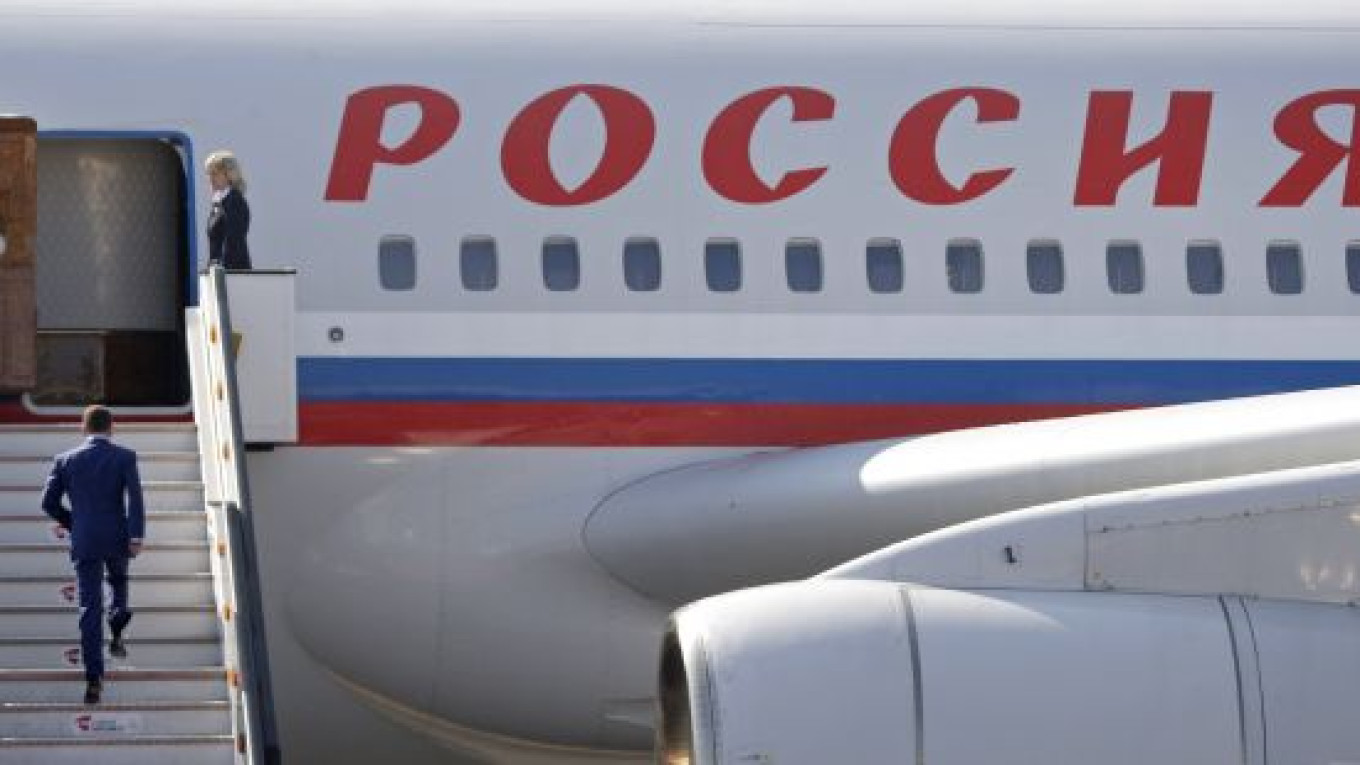Aeroflot said Thursday that it may launch a subsidiary budget airline as part of plans to dominate the domestic market and said it may sell more shares in a free float.
The carrier will become one of Europe’s 10 largest airlines, with 20 million passengers annually, once six regional airlines come under its control next year, CEO Vitaly Savelyev said at a news conference.
Aeroflot is set to gain control of the regional airlines from state-owned conglomerate Russian Technologies, and the two have been in talks with the government on how to integrate the airline assets. Aeroflot will sign an agreement with Russian Technologies on the deal by the end of the month, Savelyev said.
Although the details of the handover are not yet finalized, Aeroflot already has ideas on integrating the other carriers’ operations with its own.
Rossia, the biggest of the six airlines, will become a subsidiary of Aeroflot, and St. Petersburg’s Pulkovo Airport, its current home base, will become an Aeroflot hub. But for the change to take effect, Rossia first must be transformed into a joint-stock company from its current status as a federal unitary enterprise, and as part of the deal, the St. Petersburg city government will gain a 25 percent stake in the airline.
In its bid to gain control of the domestic market, where its main competitor is S7 Airlines, Aeroflot may roll out a separate charter flight operator and a budget airline, while Aeroflot itself would remain a “premium-class” airline, Savelyev said. The chief executive officer gave no further details on the possible new carriers.
As part of Aeroflot’s growing pains, it will now have to expand into Sheremetyevo’s new Terminal E, in addition to its operations in Terminals D and F. The newly opened Terminal D is already too small for the airline, as the initial plans to handle 7 million passengers annually has already been adjusted to 12 million passengers and still is not sufficient to accommodate the airline.
Terminal E will open in the second quarter of 2010, Sheremetyevo has said. Terminal D and E will eventually service foreign flights, which will make up 55 percent of the company’s business.
Savelyev estimated that the company would post a profit of $100 million from 2009, not counting the fees that it receives from international carriers for overflight rights.
The company saved $39.4 million by integrating fuel purchases and switching to electronic auctions for tour operators but estimates that it lost $450 million because of lowering ticket prices, he said.
Savelyev also said the company might float some or all of the 19.5 percent stake currently owned by Alexander Lebedev on the open market once a deal to repurchase the shares goes through.
Aeroflot already bought back 6.3 percent from Lebedev and has plans to buy the rest, but Lebedev’s National Reserve Corporation said last week that it may change its mind about the sale.
Alternatively, Aeroflot could use the repurchased stake as part of the deal to acquire the regional carriers from Russian Technologies, he said. “The government will make the final decision whether they will get the stake.”
A Message from The Moscow Times:
Dear readers,
We are facing unprecedented challenges. Russia's Prosecutor General's Office has designated The Moscow Times as an "undesirable" organization, criminalizing our work and putting our staff at risk of prosecution. This follows our earlier unjust labeling as a "foreign agent."
These actions are direct attempts to silence independent journalism in Russia. The authorities claim our work "discredits the decisions of the Russian leadership." We see things differently: we strive to provide accurate, unbiased reporting on Russia.
We, the journalists of The Moscow Times, refuse to be silenced. But to continue our work, we need your help.
Your support, no matter how small, makes a world of difference. If you can, please support us monthly starting from just $2. It's quick to set up, and every contribution makes a significant impact.
By supporting The Moscow Times, you're defending open, independent journalism in the face of repression. Thank you for standing with us.
Remind me later.


